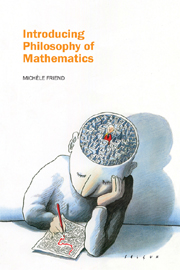Preface
Summary
This book is intended as an upper-level undergraduate text or a lower-level graduate text for students of the philosophy of mathematics. In many ways the approach taken is standard. Subjects discussed include Platonism, logicism, constructivism, formalism and structuralism; others that are less often discussed are also given a hearing.
This is not meant to be a comprehensive handbook or definitive exhaustive treatment of all, or even any, of the ideas in the philosophy of mathematics. Rather, this book contains a selected set of topics that are aired in such a way as to give the student the confidence to read further in the literature. A guide to further reading is given at the back of the book. All the books cited are in English, and should be available from good university libraries. Having read this book, the student should be equipped with standard questions to bear in mind when doing further reading. The arguments rehearsed in the text are by no means the final word on the issues. Many open questions reveal themselves, inviting further investigation. Inevitably, some of my prejudices can be detected in the text.
Most of the chapters are self-contained. Anomalous in this respect are Chapter 1 on infinity and Chapter 2 on Platonism. Chapter 1 is a technical chapter. I believe that students of the philosophy of mathematics should have a grasp of what the mathematician means by “infinity”, since many of the philosophies of mathematics either have something direct to say about it, or use the concept implicitly.
Information
- Type
- Chapter
- Information
- Introducing Philosophy of Mathematics , pp. ix - xiiPublisher: Acumen PublishingPrint publication year: 2007
